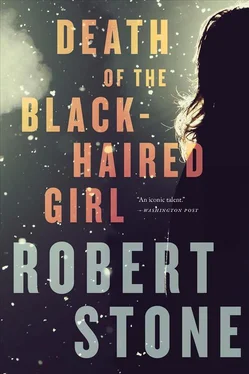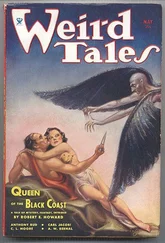“Maybe I should have driven her home,” Brookman said. “Obviously I should have driven her home.”
Salmone said nothing.
“Are we finished?” Brookman asked.
Salmone stood up.
“Who do you think that driver was?”
Brookman stared at him in surprise.
“I hope you find him.”
“We always do,” Salmone said. “You have anything more to tell us, Professor, you have my card. Don’t hesitate. You gonna be around?”
Brookman thought about it for a moment. His not being around was an idea that had not occurred to him.
“Well,” Salmone said. “We’ll be here.”
Brookman decided to engage a lawyer the next morning.
ONE COLD DAY STACK TOOK the Long Island Rail Road to the McCallum and Jenkins funeral home, the people who had contained his wife’s ashes.
“I’d like my daughter’s remains beside my late wife’s,” he told the slightly overweight, fair-haired undertaker, a McCallum. McCallum expressed his sympathy, especially for a person so young. Stack saw that his sympathy was as genuine as it could be in such circumstances. The younger McCallums went to seminars and did meditation to the tinkling of bells.
“Have you arranged this with the church, sir? I presume interment will follow a Mass of resurrection.”
“I don’t think she would want a Mass.”
“Mr. Stack, isn’t your late wife at the cathedral?”
“Holy Redeemer, right.”
“It would follow the same procedure, Mr. Stack. May I ask why you believe Ms. Stack wouldn’t want a Mass?”
“She wasn’t religious. She loved her mother very much. She missed her mother a whole lot. She would want to be beside her.”
“Sir,” the young man said gently, “it all goes together. Can you be sure she wouldn’t want to follow mom’s way?”
“I have no beef with you,” Stack explained. “I’m hoping to take care of this.”
“We’ll follow your instructions, Mr. Stack. I think we’ve served the Stack family for generations.”
“Since your place was on First Avenue.”
It was true, although Stack had never much thought about it. McCallum and Jenkins funeral parlors had managed to remain local, moving in the same pattern of families like the Stacks, from certain Manhattan neighborhoods. They had buried a lot of soldiers since after the Civil War. Different kinds of people favored different firms, and M&J was well regarded by the unlucky. The McCallums had extended credit to prisoners’ widows without benefits or influence, and for reasons of their own they had served AIDS victims from the beginning. There were those who disliked that.
“One thing we can’t do,” McCallum said, “is guarantee a place with Ms. Stack’s mother in Holy Redeemer. They have their rules and costs, et cetera. So you’ll have to deal with them, Mr. Stack.”
“The urns are standard, right?”
“Sir?”
“The urns, the whaddaya calls? What you put ashes in. They all look alike, right? Do you make them? Do you sell them?”
“Usually…,” McCallum said.
“Pick up my Maud. Put her in the thing. I’ll talk to the church then. I need to do this, see.”
He gave McCallum a copy of the death certificate.
“It’s a very simple ceremony,” McCallum said. “These physical things, the earthbound things, they’re partly for friends and family. In the tradition.”
“Still,” Stack said. It was what Maud would have said.
“I don’t know what to say, Mr. Stack. I’m sorry.”
“I’m determined to try to get Maud what she wanted. She never had a life.”
McCallum looked him in the eye.
“I can understand your feeling that, Mr. Stack. The thing is, we’ve always worked with the church. Within its traditions.”
“I’ll talk to them. I want my daughter with her mother.”
“We can do a lot of things to serve you, Mr. Stack. I can’t simply get your daughter’s remains into Holy Redeemer Church.”
The next day he took the train to the cathedral to look at the niches along the wall. Ashes were held in little marble-like repositories that had lids on the tops like cigarette boxes, and in glass cases like imitation medieval reliquaries Stack remembered growing up with. In his own parish church in Richmond Hill there was a bone in a similar case. The faithful would kneel devoutly in front of the bone and smooch the glass on the front of it so that there was always a surface of spittle-laced, fogged-up glass on the case containing the alleged bone of Saint Wallbanger or something reposed in it. Next to it was a gray rag of dingy sheeting to wipe the glass with, in order not to catch polio or mouth fungus or something like it from the glass. Sane people who felt compelled to take part in this kissy game staged a lip-smacking air kiss and pumped the rag on the front of it, wondering what diseases you could catch off the cloth. It was a disgusting little sacramental moment a guy could joke about with the right people.
BROOKMAN CALLED ON Dean Spofford at the dean’s home, not at his office in College Hall. John Spofford’s house could surprise, with its grace, people who had spent a lot of time entering tastefully appointed residences on eastern liberal arts college campuses. The grandest of the contents in the Spofford house belonged to the college, but a great deal of what was luminous and beautiful belonged to Spofford and his wife. The best effects were Mrs. Spofford’s.
The Brookmans and the Spoffords had been acquainted for some years. Steve Brookman and John Spofford were, at times anyway, close to friends. They had both served in the Marine Corps during the same period. When he entered the house, Brookman caught a glimpse of Mary Pick, so known though she was Dean Spofford’s wife. Brookman told her good morning. It cheered him that she gave him a friendly look and spoke a good morning.
“Good morning, Steven. It’s so terrible.” Mary Pick did not ironize or shave inflections in times of trouble. “John will be in in just a moment. You don’t need anything?”
He listened to her withdrawing heels on the polished hallway floor and was actually comforted.
The dean received guests in the sort of elegant room that went with his job. As he sat in it, waiting, Brookman meditated on the footsteps of the woman who had addressed him, a woman he liked and admired, a woman much observed and speculated upon at the college.
She was a very attractive blue-eyed brunette, English in congenial and unthreatening ways. As had become virtually required, she had an occupation in addition to being the dean’s wife; with a certificate in art history from the Courtauld, she held a position at an auction house that took her twice a week to New York. This allowed some college folk to refer to her as a gallery strumpet. Because she was so fine and reticent she had become the object of fantasies. People, particularly people who disliked John Spofford, hoped she had a lover, likely in New York. Egotists, mostly male, dreamed. Mrs. Spofford was used to lingering glances — even to the rare boozy attack of footsie — at dinner parties. She coped without effort. In their dorms, her student admirers waggled and blazed. What secrets had she?
One of her secrets was that every Sunday she walked a mile and a half, in every weather, in an ankle-length raincoat and with a scarf tied under her chin, to St. Blaise’s, a ruinous church where a Mass was said at eight in the morning in Latin by a tiny, eighty-something Irish priest. Occasionally she helped an elderly Ecuadorian cleaning woman tidy the retired priest’s back-garden apartment. Both the priest and the old lady would stand at some sort of attention when Mrs. Spofford arrived, and she had given up trying to put them at ease. Once the priest had started to rise from his chair at her presence, and she had discouraged his doing it so commandingly that he had almost died sitting there. Mrs. Spofford was sometimes useful at Mass because he often forgot the responses and she had them handy.
Читать дальше












